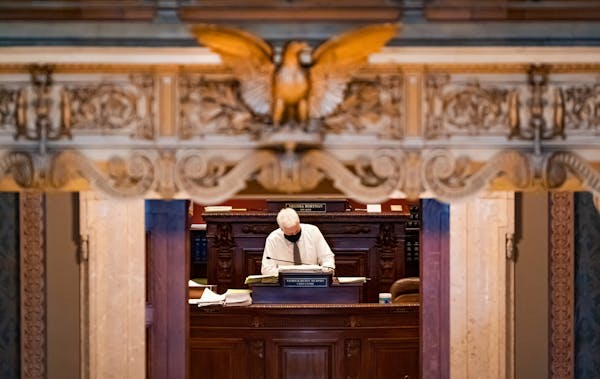Minnesota legislators shuffled through paperwork, debated minor provisions in state budget bills over Zoom and repeatedly refreshed their e-mails heading into Monday's adjournment deadline, waiting for progress on issues that have stymied legislators for months.
Gov. Tim Walz and leaders in Minnesota's divided Legislature met in closed-door negotiations all weekend to try and reach a broad agreement on numbers around the state's roughly $52 billion budget.
Walz spokesman Teddy Tschann said in a statement Sunday that "negotiations are ongoing, and the Governor remains optimistic that state leaders are close to reaching a compromise."
As legislators stare down a midnight deadline to adjourn on Monday, disagreements remain on how to spend a $1.6 billion surplus and $2.8 billion in federal COVID-19 aid.
Democrats are frustrated over lack of momentum on significant police reform measures. Republicans are equally frustrated that Monday's adjournment date lines up with the delayed deadline to file taxes, yet there's still no deal exempting federal Paycheck Protection Program loans and unemployment insurance from state taxes.
"I can't imagine how every taxpayer in the state of Minnesota feels. The taxes are due, the taxes are due Monday," Republican Senate Taxes Chair Carla Nelson told members of the taxes conference committee on Saturday. "They probably have them sitting ready to go, waiting to hear from the Legislature."
Some businesses have taken out loans to pay their state taxes or filed for extensions hoping legislators would come to an agreement on tax cuts, said Beth Kadoun, vice president of tax and fiscal policy at the Minnesota Chamber.
With no agreement in hand, Senate Republicans were prepared to move quickly Monday on tax cuts if needed, while House Democrats planned to vote on multiple state borrowing proposals on the floor, including one that would help with construction costs to rebuild parts of Minneapolis and St. Paul damaged by civil unrest last year in the wake of George Floyd's killing.
While legislators are constitutionally required to adjourn by midnight, more often than not they go into overtime special sessions to finish all of the budget work during odd-year sessions. That's happened every budget year but three since 2001, including two years where disagreements stretched into partial government shutdowns. That will happen if they don't pass a budget before July 1.
Walz extended his emergency powers to respond to the pandemic for another 30 days on Friday, meaning lawmakers could be automatically called back in mid-June if he extends them again.
The reality of an overtime special session to finish the work has seemed inevitable at the Capitol all week, as the days ticked by and time ran out to process all of the massive budget bills before Monday. The usually bustling Capitol grounds were quiet. Meetings wrapped up during daylight hours at a time of the year when legislators are usually working round-the-clock.
But leaders continued to filter in and out of negotiations all week and weekend and remained optimistic that they could still hit those broad budget agreements before Monday's deadline. Walz cast a line on Otter Tail Lake early Saturday morning for the Governor's Fishing opener, caught a perch and then rushed back to St. Paul for more budget negotiations.
Yet leaders on both sides said those talks have produced slow progress.
